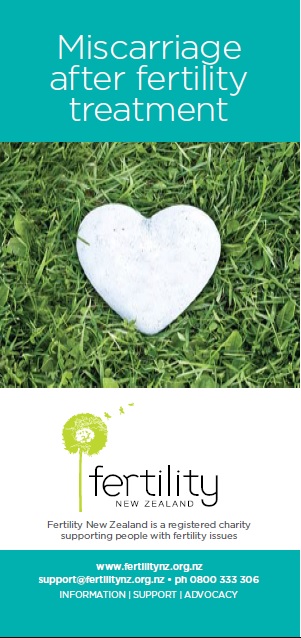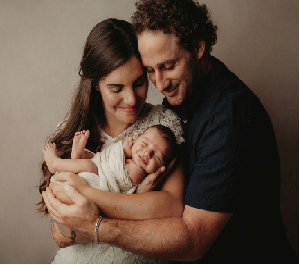Miscarriage after fertility treatment
“ Just because no child was born and just because I didn’t feel the life of that baby, doesn’t mean I didn’t love, lose or mourn its leaving. It was my baby - someone – even if I never saw the colour of hair or shape of face - a baby was there just the same.”
The loss of your baby early in pregnancy can have a profound effect on you and your partner. Miscarriages are a reality in any fertility programme, although the use of assisted reproductive technology only slightly increases the chance of miscarriage. About 20% of pregnancies end in miscarriage, most often because of a genetic problem which stops the baby from developing normally.
At the time of the loss of your pregnancy you may simply be in a state of numbness and shock. The news may come completely ‘out of the blue’ at an ultrasound scan when you expected to see a beating heart. It may come when you are told about falling blood hormone levels or it may come after days of cramping, spotting and uncertainty.
Regardless, the confirmation that your pregnancy is over is likely to throw you into a state of shock and powerlessness. Often the shift from being pregnant to not being pregnant occurs within the space of 12-18 hours. The speed of this event contributes to your sense of unreality. You may have miscarried at home, perhaps alone. This may well have been a frightening experience when you did not really know what was happening or what to do next.
The first days and weeks
Physically, it is likely that you will feel tired and have very little energy. Cramps may last a few days and you may bleed for up to 3 weeks. Your breasts may feel tender and uncomfortable. You will experience many different emotions as a normal response to your pregnancy loss, but you may not have been expecting to have such intense feelings, and may feel worried that your reaction is not normal.
Everyone reacts differently to a miscarriage, but your own experience of grieving will be right for you. There is no single predictable pattern which your
feelings will take. Instead, you will move slowly and unevenly through a confusion of different emotions, eventually reaching a time when the memories of your baby and your miscarriage have become part of your life and the feelings are less painful.
Coping with grief
You may become very tearful and sad. Your body has to adjust to the loss of pregnancy hormones, and so you may feel that your moods swing erratically from calm to distress and back again. A chance remark, a song, or seeing a baby in a supermarket may make you feel sad, angry or resentful.
You may feel like retreating, staying at home, even in bed, and not exposing yourself to the stress of shops, work and the outside world. By experiencing a few days of stillness, without too many external demands, you can acknowledge the meaning of your loss to yourself and ‘make space’ for any feelings to emerge. It may not be easy to take such time from the demands of family or work.
You may find, especially if your days are busy, that you have trouble getting to sleep or that you wake up in the night, possibly crying or distressed. Often you have been dealing with the needs of everyone else in your life and the quiet time at night is the first opportunity you have had to acknowledge and notice your feelings. If you can, take the opportunity of using this quiet time to help you absorb and adjust to what has happened. You may want to write down the story of your miscarriage, or to draw, or simply to sit quietly with a hot drink. For many women, this sleeplessness can be a distressing and lonely time. It helps to know that it is not likely to last more than a few weeks, at most.
You will probably find that these times of intense sadness and emptiness lessen with time, but that you still re-visit these intense feelings occasionally.
There are times and events which can make you feel especially vulnerable, including your next period, the due date of your baby’s birth, Mothers Day, Fathers Day, Christmas, the pregnancy of your best friend, the anniversary of your miscarriage, and if you choose to begin fertility treatment again. Being able to acknowledge these times in advance will help you understand your responses better.
Men and women often have differing reactions to miscarriage. A loss, particularly early in pregnancy, often has a greater impact on the woman who has been conscious of subtle body and mood changes. Men often say that they have not experienced a direct sense of loss, but are distressed and perhaps a bit bewildered by their partner’s reactions. Other men may find that they too feel loss and emptiness. They may have been the ‘strong’ partner dealing with hospitals, employers and family, and seldom receiving any acknowledgement of their own feelings.
You may be disappointed, hurt and angered by the reactions of your family, friends and workmates. They may seem to dismiss your miscarriage as unimportant and expect you to pull yourself together after a very short time. They may not even mention the miscarriage or refer to the baby. If you have had other miscarriages, they may assume you know how to deal with it all and that you should stop trying to have a baby. Sometimes you will be surprised and comforted by the caring reactions of others, and you will hear of other women’s miscarriages – even from years before.
If this miscarriage has been the latest of many pregnancy losses, or occurred after years of infertility and treatment, then your response to it may not be the same as the reaction of a woman who is younger or who has other children. This is not to minimise her loss. But you may be facing the loss of the possibility of ever becoming parents, and so the loss of your pregnancy will have a double significance for you.
Recovering after a miscarriage
Your needs after a loss in pregnancy can be described very simply:
- time;
- acknowledgement of the reality of your loss;
- opportunity to end your pregnancy in some symbolic way.
You are likely to have been dreaming about yourselves as parents long before the actual conception of this baby. The actual pregnancy creates a sense
of attachment, an urge to protect and nurture the pregnancy and to imagine the character and behaviour of this growing baby. A miscarriage, even after only a few weeks of pregnancy, comes as a loss of all these dreams and the loss of someone close to you.
A miscarriage after months or years of trying for a pregnancy will seem especially cruel and unfair. If it feels right, you may find it helpful to commemorate your baby’s brief life in some symbolic way. If your loss occurred later in your pregnancy, and you gave birth to a baby whom you could see, hold and show to your family, then you may already have had some opportunities to make the loss real for yourself; photographs, footprints and other mementoes, a blessing or naming ceremony, a funeral service. Rituals like these are powerful in their healing. They acknowledge your status as parents, they affirm the reality and unique individuality of your baby, and they provide an opening for others to offer their sympathy. You can also feel that you have been able to provide a respectful ‘farewell’ for your baby and to be responsible parents.
Your miscarriage may have occurred early in the pregnancy before a recognisable baby has formed, or you may not know what happened to your ‘products of conception’. You can still create for yourselves a symbolic end to your pregnancy. You can do this months and even years after the event. Some parents have named their baby and held a blessing ceremony with a celebrant or a service with local clergy. If the sex of the baby is not known, a name can be chosen that works for both girls and boys or the parents can ‘decide’ the sex for themselves based on their own feelings and intuition. Others have planted a shrub or a tree (in a pot if necessary), or created a book of paintings or poems, or walked by the sea with their partner, or scattered flowers in the wind, or released a helium-filled balloon or purchased a special piece of jewellery. You yourselves will know what kinds of rituals and ceremony fit with your lifestyle and beliefs.
Being able to bring your pregnancy to an end in an inner, emotional sense can help ensure that your feelings have caught up with the physical events and experiences of the loss of your pregnancy.


